6 most important things Facebook announced at F8 2017
Augmented reality, bots and a big virtual reality tease
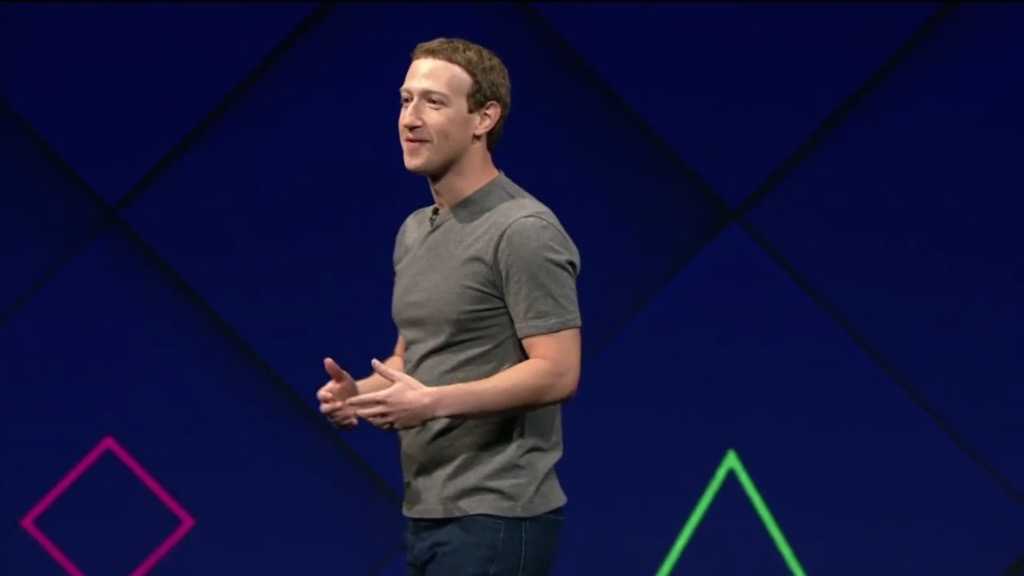
Facebook's annual developer conference is underway, and while we didn't get major announcements in the way of an Oculus Rift 2 virtual reality headset, the social network still swung for the fences with new products and updates to its existing services.
Here's a look at the six most important things Facebook announced during its F8 2017 Day 1 keynote!
1. Facebook Spaces
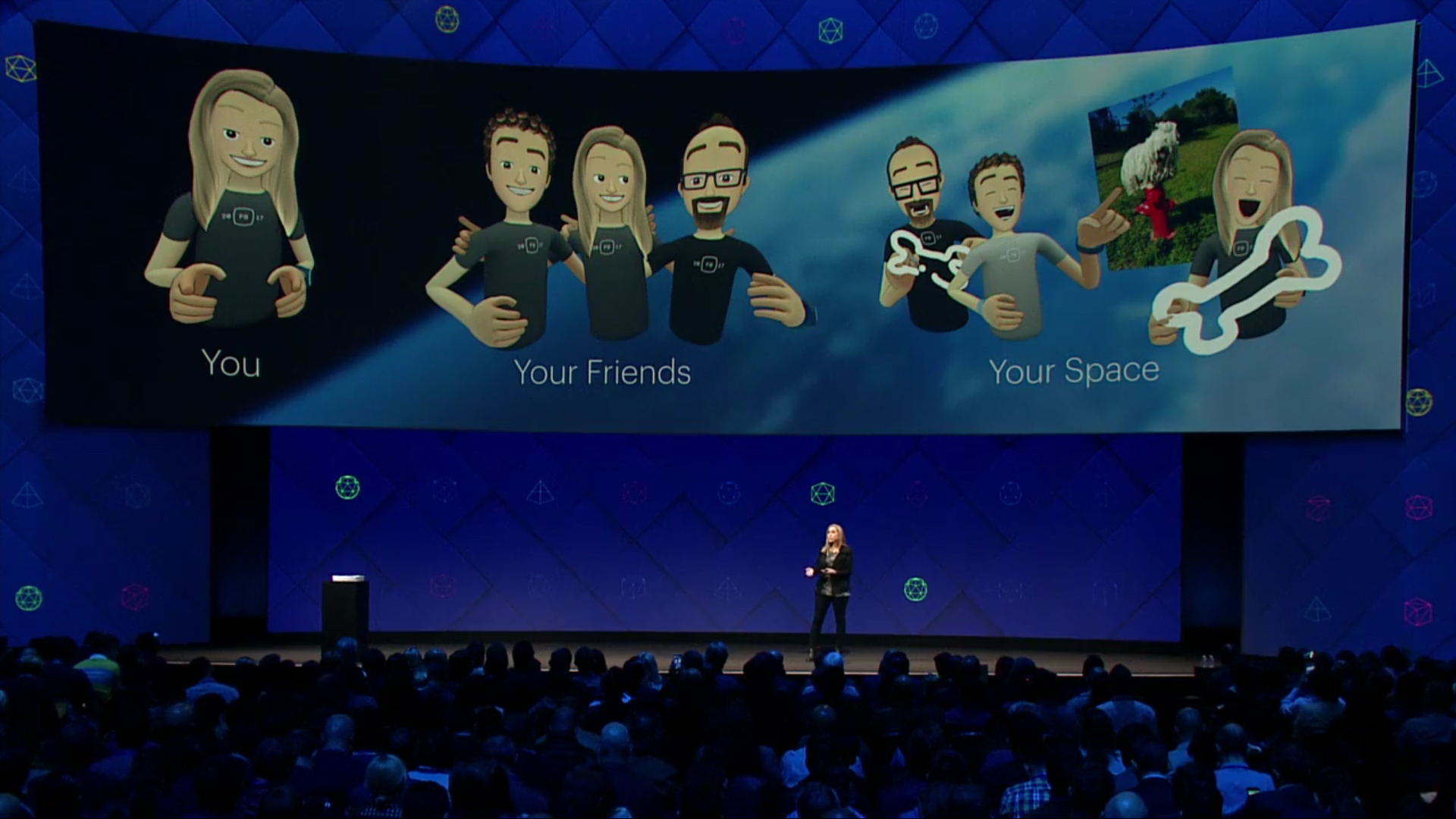
By far the biggest actual product Facebook announced is the launch of Facebook Spaces, its first social virtual reality offering.
Spaces is essentially a way to hang out with friends in virtual reality. A digital avatar that represents yourself can pal around with friends and family in VR chat rooms. These rooms can be anything from outer space to a locale you're visiting via 360-degree video.
One of the neatest features of Facebook Spaces is that you can bring in friends who aren't in VR using Facebook Messenger video chat. Facebook also lets you create 3D shapes that you can move around in VR, which is pretty damn neat.
Users of Oculus Rift and Oculus Touch can start exploring Facebook Spaces today through the early access section in the Oculus Store.
2. Facebook camera as an AR platform
The running theme of the F8 2017 keynote was augmented reality and Facebook's mission to make it the next big platform. Not only that, but Facebook has identified the means through which to make that happen.
Sign up for breaking news, reviews, opinion, top tech deals, and more.
CEO Mark Zuckerberg admitted that while he used to view glasses as the future of AR, he's since changed his perspective. Now, he wants to "make the camera the first mainstream augmented reality platform." Yes, the camera in your phone or other smart device.
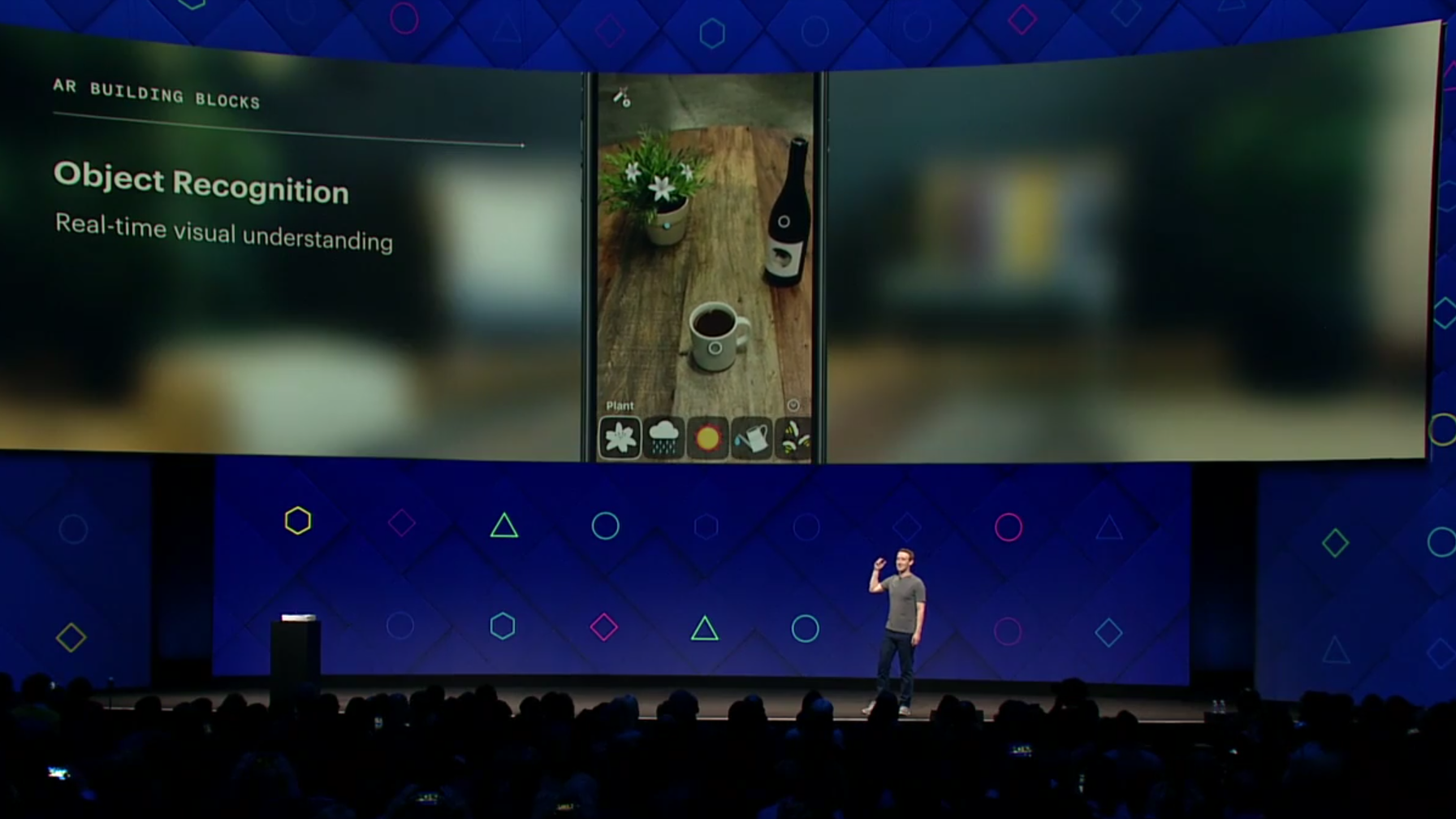
To that end, Facebook is launching a number of AR tools for the camera in a closed beta today, collectively called the Camera Effects Platform.
Frames Studio is the first product within the platform, and it's an online creative editor that lets developers make frames for pictures of for any image taken with the Facebook camera. Frames Studio is available globally right now.
Then there's AR Studio, a tool set to help content creators make their own masks, filters, animated frames, and effects, such as a custom celebration overlay for the Manchester United football team. The idea is to make it as painless as possible for developers to create AR effects that respond to the environment, movement and interactions in Live videos, and make those available to users. AR Studio is out now in beta.
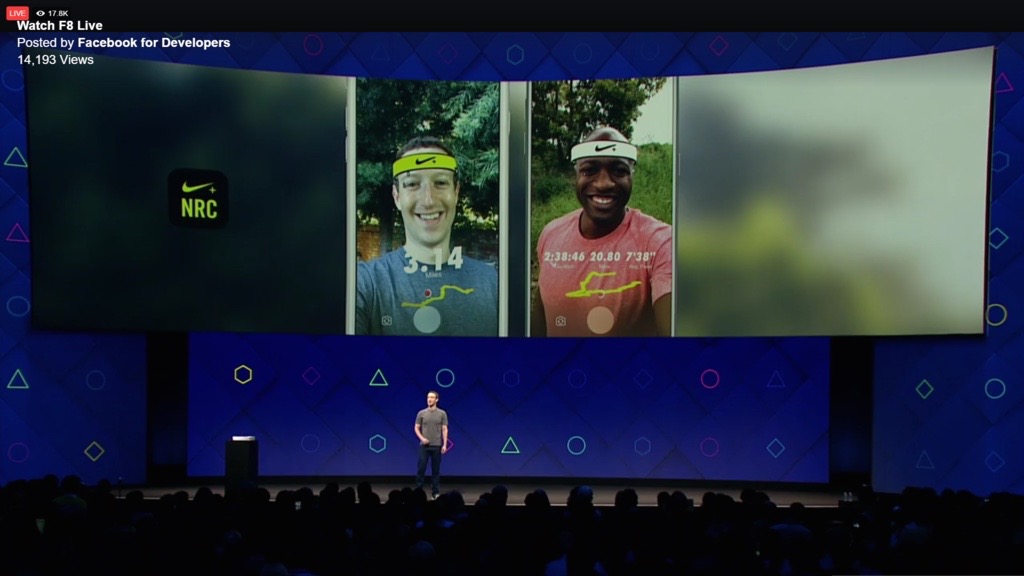
If all of this sounds like Snapchat to you, you're right on the money. Facebook is clearly trying to play catch-up to the filter and mask-happy platform, and Zuckerberg even admitted Facebook is late to the AR game.
While these features are relatively novel right now, Zuckerberg noted we're more likely to share photos when they are fun/funny, so this is a smart play to get users posting more content onto the social network, effects and all. It also lays the ground work for more advanced functions down the road, and it's clear Facebook isn't done developing on the AR front yet.
3. Say hello to Facebook Messenger Platform 2.0
Over 1.2 billion people using Facebook Messenger every month, so of course the chat platform got plenty of play on the F8 stage.
Facebook is launching Facebook Messenger Platform 2.0, infusing its system with even more artificial intelligence to connect users with more businesses and, on the flip side, help businesses connect with more users.
Among the additions are a new Discover tab to help users find relevant businesses, such as ones in their area. This is rolling out slowly to people in the US starting today.
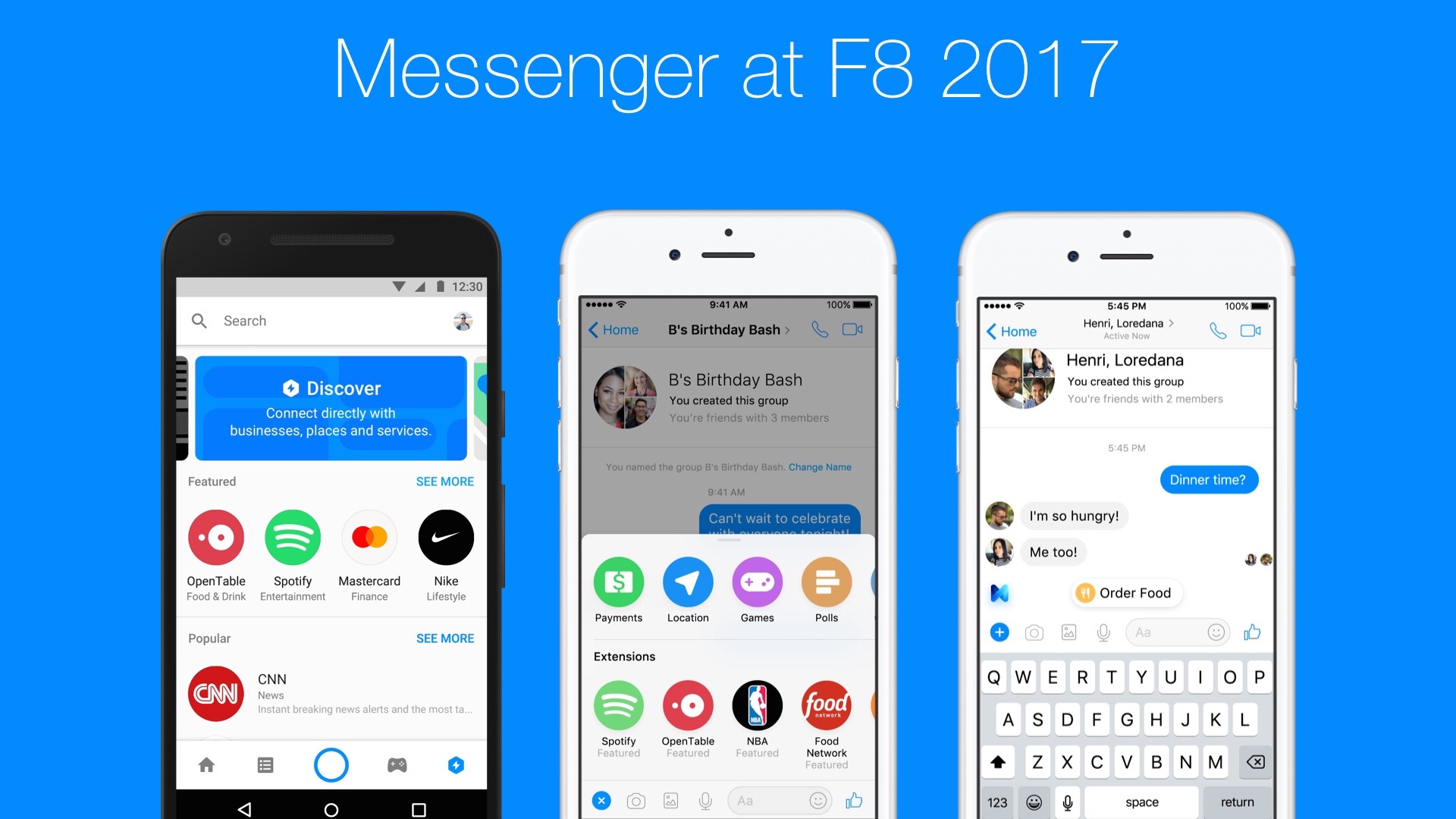
Parametric codes are also coming, allowing for one bot to tap into multiple codes (not just QR) through the Messenger camera.
Then there's Chat Extensions, which allow for more than "single player and one-to-one chats." Extensions allow for multiple people to chat with the same business at the same time. This also allows for sharing of content from a bot with one chat group, such as songs through Spotify and Apple Music.
Gameplay in Messenger is also getting a boost through game bots and "Rich Gameplay," which is essentially turn-by-turn games. You can also tap the new Games tab in the Messenger home screen to challenge your friends. This tab is making it to a few select folks in the US starting today.
4. M digital assistant gets much smarter
Facebook's M digital assistant also got a few new features as part of the Messenger revamp.
These include making suggestions in your conversations, such as a sticker that reads "thank you," a reminder of an upcoming meeting, or nudging you that you need to pay so-and-so back.
M taps into artificial intelligence to recognize people and tasks in your conversations, Facebook says, helping it make smart recommendations based on context. Of course, since 98% of every conversation revolves around food, this includes helping you make a meal order via delivery.com.
5. Better business bots
The initial response to bots was a tepid one, but it seems they've since gained momentum, with over two billion conversations taking place between users and businesses in Messenger in one month, Facebook says.
Facebook is giving bots even more oomph today, including introducing smart replies that allow Pages to answer the most frequently asked questions using the Wit.ai bot.
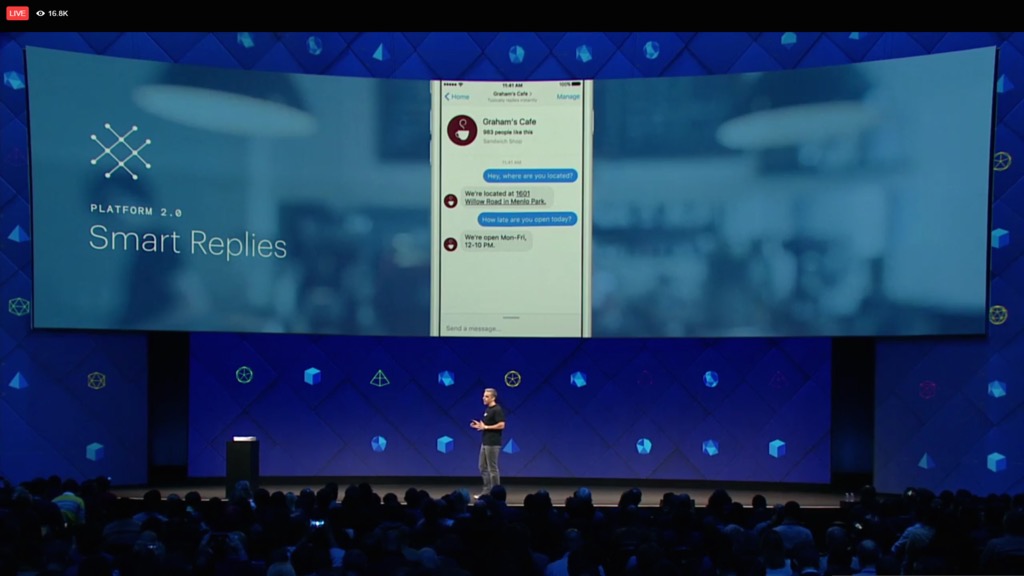
Businesses can also create multiple parametric QR codes for a single bot, again letting customers use a number of codes through the camera to accomplish a single task, such as paying at a restaurant.
Finally, Facebook is now letting businesses to create more than one bot with different developers. So, a business may want to create a personal shopping bot with one developer, then another bot that handles customer service queries with another. Now, businesses are empowered to do this, utilizing multiple bots created by the most appropriate developer to better serve customers.
6. Wireless virtual reality headset tease
Alright, Facebook didn't announce anything related to its wireless virtual reality headset, but it sure gave us a few good looks during the Day 1 keynote and teased how the headset, which again lacks a PC tether, works.
Originally revealed at the Oculus Connect 3 conference in October 2016, the prototype, called Santa Cruz, was seen in action via video.
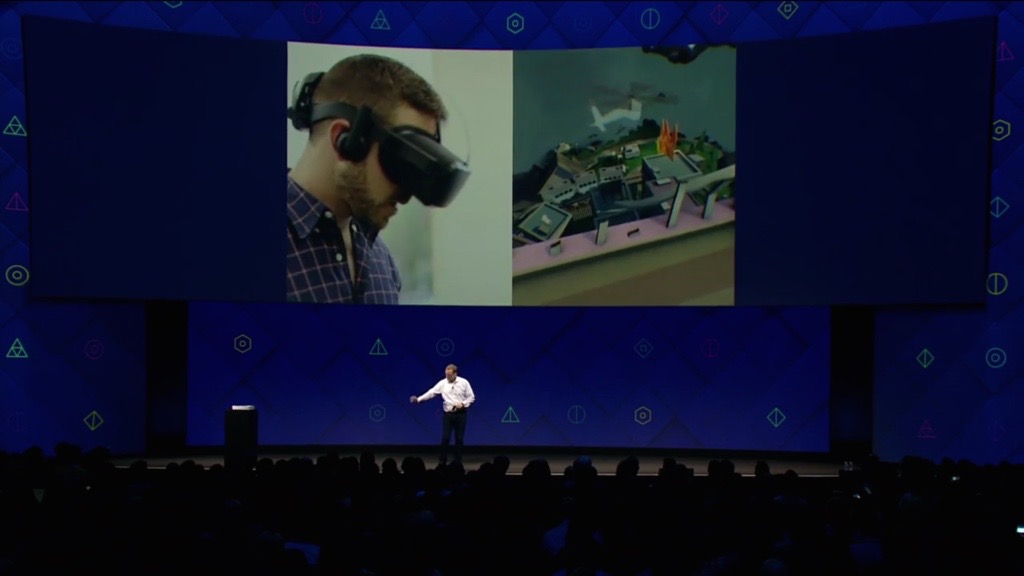
Yes, this was the same clip also shown at OC3, but it shows Facebook hasn't forgotten about the wireless headset. It appears to be progressing nicely, a good sign for wireless VR hopefuls.
What's more, thanks to Facebook Chief Technology Officer Mike Schroepfer, we learned the headset relies on computer vision to cut the cord. Using a technique called Simultaneous Localization and Mapping, or SLAM, the headset's four built-in cameras can detect how the environment around you changes and mirrors movement in the virtual world. No phone, no PC required. It's all in the headset, which lets you move around freely with no nauseating effects.
How long till we see Santa Cruz in live action, and even more importantly, how long until its on sale? We can't imagine it will be much longer, though an unveiling at Oculus Connect 4 (presumably in October 2017) and holiday release seem the most plausible.
Zuckerberg also said Facebook is working on new VR input methods, including hands free. He slipped on some Oculus gloves a few months ago, so while we'll likely see those mitts before long, it sounds like Facebook is already looking beyond manual controls.
- These are the best virtual reality headsets of 2017

Michelle was previously a news editor at TechRadar, leading consumer tech news and reviews. Michelle is now a Content Strategist at Facebook. A versatile, highly effective content writer and skilled editor with a keen eye for detail, Michelle is a collaborative problem solver and covered everything from smartwatches and microprocessors to VR and self-driving cars.